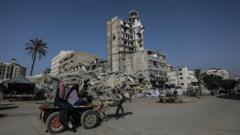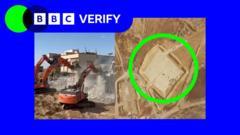Amid a continuing blockade, the Gaza Humanitarian Foundation, supported by the U.S., plans to distribute aid and has reached agreements with Israel for operations. However, concerns about the feasibility and accessibility of the plan have been raised by various groups.
New Initiative for Gaza Aid Faces Scrutiny Amid Blockade Concerns

New Initiative for Gaza Aid Faces Scrutiny Amid Blockade Concerns
The Gaza Humanitarian Foundation aims to establish an alternative aid system but is met with skepticism regarding its effectiveness and implementation.
A newly established foundation, the Gaza Humanitarian Foundation, is set to bring relief to the war-torn Gaza Strip, having secured agreements with Israeli authorities to begin operations by the end of this month. This initiative, backed by the previous U.S. administration, intends to create a new framework for aid distribution in order to alleviate the suffering of Gazans during an ongoing blockade that has been in place for two months.
This blockade, implemented by Israel to exert pressure on Hamas, has raised alarm from various international agencies and some Israeli military voices regarding a potential famine among Gazans. The blockade has restricted food and fuel deliveries, placing many residents in a precarious situation where the only sustenance comes from charity kitchens operating within the enclave.
The foundation's strategy involves creating distribution centers to serve hundreds of thousands of residents. Yet, some humanitarian groups voice significant concerns over the practicality of this approach, suggesting that requiring vulnerable citizens to travel long distances to reach these centers could exacerbate the humanitarian crisis rather than alleviate it. The feasibility of effectively reaching those in desperate need is a central worry among critics of the initiative.
In its latest statement, the Gaza Humanitarian Foundation outlined key progress, having solidified arrangements for the delivery of aid as it prepares to set up distribution sites. Among the agreements are provisions for immediate aid access while the distribution infrastructure is developed, enhancing the initiative's chances for success.
As the foundation moves forward, it remains crucial to monitor how well it can navigate the complexities of the situation in Gaza, particularly in ensuring that aid reaches those most in need without further complicating access in an already dire context.






















